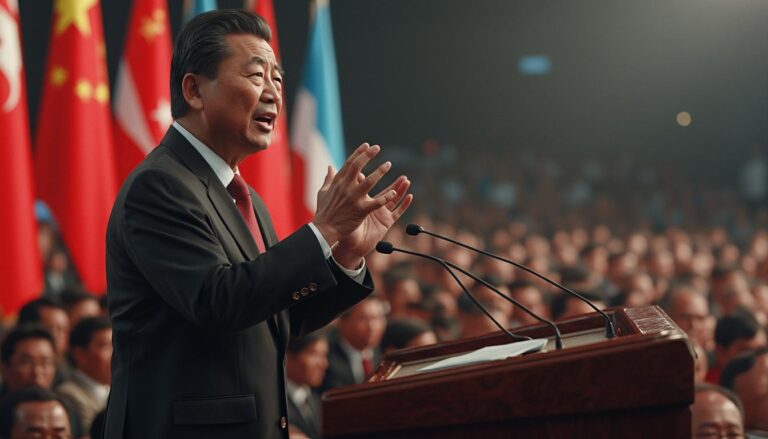President Donald Trump expressed his anger towards Russian President Vladimir Putin following the criticisms of the legitimacy of Ukrainian leader Volodymyr Zelensky.
This tension arises in an already fragile international context, where relations between the United States and Russia are under close scrutiny.
Trump threatened to impose secondary tariffs on Russian oil if no ceasefire agreement is reached.
During an interview with NBC News, Trump stated that if Russia failed to stop the violence in Ukraine, he would consider imposing an additional 25% tariff on all oil coming from Russia. He also announced that entities purchasing Russian oil would no longer be able to do business in the United States, thereby increasing the economic pressure on Moscow.
Despite these firm statements, Trump emphasized that he and Putin have “a very good relationship” and that his anger would quickly subside if Russia took a constructive approach. He also mentioned his intention to speak with Putin again within the week.
On his part, Putin has long labeled Zelensky as the “illegitimate” leader of Ukraine, demanding a change of government since at least 2021. However, according to the Institute for the Study of War, these comments have decreased after a phone call between Trump and Putin on February 12.
In an interview with Kremlin journalist Pavel Zarubin on February 24, Putin acknowledged Zelensky’s legitimacy, although his criticisms persist. He suggested that the United Nations could establish a temporary government in Ukraine to organize democratic elections, which could allow for negotiating a legitimate peace treaty.
Kremlin spokesperson Dmitry Peskov downplayed these statements, calling them “ideas to consider.” In the meantime, Zelensky condemned Russia’s prolonging of the war and urged the United States, Europe, and its allies to respond to the “terrors” inflicted on his people.
Current events anticipate Ukrainian elections as early as June, provided a ceasefire is established by May 8, in accordance with Ukrainian legislation. Furthermore, the Russian Ministry of Defense claims to have made significant advancements on several fronts in Ukraine, while the Ukrainian Ministry of Defense reports significant losses among Russian troops.
Table des matières
ToggleTrump reacts to Putin’s criticisms of Zelensky
The President of the United States, Donald Trump, expressed his deep anger towards Russian President Vladimir Putin following the latter’s recent criticisms regarding the legitimacy of Ukrainian leader Volodymyr Zelensky. In an interview with NBC News, Trump stated: “If Russia and I do not reach an agreement to stop the bloodshed in Ukraine, and if I think it is Russia’s fault, I will impose secondary tariffs on Russian oil.” This statement underscores Trump’s determination to use economic leverage to influence Russia’s actions.
The economic consequences of Trump’s threats
Trump announced his intention to impose a 25% tax on Russian oil as well as on other products if Russia fails to reach a ceasefire in Ukraine within the coming month. “Entities buying Russian oil will no longer be able to do business in the United States,” he added. This decision could have major repercussions on the global energy market and exacerbate economic tensions between the two nations. Businesses and countries reliant on Russian oil imports could face increased costs, pushing some to seek alternative energy sources.
The complex relationship between Trump and Putin
Despite these tensions, Trump emphasized that he maintains “a very good relationship” with Putin and that his anger could quickly subside if Putin “does the right thing.” This duality in their relationship reflects the complexities of modern diplomatic relations, where personal alliances can influence political and economic decisions. Trump also indicated that he plans to speak with Putin again within the week, suggesting a willingness to resolve differences through dialogue.
The controversial statements of Vladimir Putin
Putin’s remarks are not new. Since at least 2021, the Russian president has labeled Zelensky as the “illegitimate” leader of Ukraine, questioning the country’s sovereignty and setting conditions for the signing of any peace agreement. In a recent statement, Putin asserted that without clear legitimacy of the Ukrainian government according to the country’s Constitution, any negotiation would be futile. These statements have intensified tensions and made it more difficult to seek a peaceful solution to the conflict.
The impact of international tensions on Ukraine
The tensions between the United States, Russia, and Ukraine have profound implications for regional stability. If Trump imposes tariffs on Russian oil, it could not only affect the Russian economy but also strengthen Ukraine’s position in its negotiations. On the other hand, Putin’s efforts to destabilize Zelensky’s legitimacy could lead to an internal political crisis in Ukraine. Past case studies show that such tensions can prolong conflicts and harm civilian populations.
International reactions and future perspectives
The international community is closely monitoring these developments. Countries like the Philippines have already designated China as the main disruptor of peace in Southeast Asia, reflecting a trend to firmly oppose actions perceived as destabilizing. Additionally, recently declassified documents reveal the anger of the United Kingdom towards former French President Chirac regarding Iraq, illustrating ongoing tensions between major powers. These complex dynamics suggest that resolving the conflict in Ukraine will require close international collaboration and skilled diplomacy.
The implications for global security
The escalation of tensions between Trump and Putin could have repercussions for global security. The imposition of economic tariffs could be seen as an economic war, pushing Russia to seek strategic allies elsewhere. Moreover, Putin’s ambitions to reshape the world order by destabilizing sovereign nations underscore the need for Western nations to strengthen their alliances and promote democratic stability. Potential UN interventions to establish a temporary government in Ukraine, as suggested by Putin, require careful assessment to avoid a new chain of international conflicts.
In the face of this situation, it is crucial for world leaders to work together to find peaceful and sustainable solutions. Trump’s economic threats, combined with Putin’s provocative statements, create a complex environment where diplomacy and diplomatic resilience are more important than ever. Ukraine, at the heart of this conflict, may benefit from increased international support to maintain its sovereignty and promote peace in the region.






















